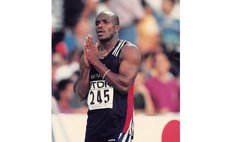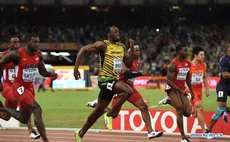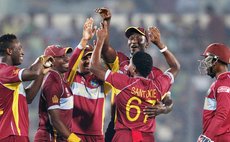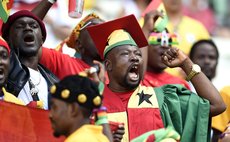Pélé nameplate to the Rio games
As I write, one Edson Arantes do nascimento was due to fulfil the honour of lighting the flame to the Olympic Games at the opening ceremony in Rio de Janeiro. Not very many outside of Brazil is aware of the name officially for the football legend better known as Pélé. The man Pélé is to football what Muhammad Ali is to boxing. Too humble and modest to call himself the greatest. Pélé in the eyes of most ranks as the greatest footballer ever to have played the game. Forget about Diego Naradonna. Forget about Lionel Messi. Forget about Christiano Ronaldo. Forget about everyone else. Nobody comes near Pélé in achievements or in sheer football stature. As the ancient experts would say, Pélé is a nonpareil! Without equal!
Born in 1940, at the age of 17 Pélé led Brazil to its first hold on the World Cup then named after its donor Jules Rimet. The year was 1958, when the fleet footed youngster amazed the Swedish crowd at the final with the brilliance of his overhead kick, eventually labeled the bicycle kick. Pélé was to go on to propel Brazil into successfully defending the World Cup in 1962 in Chile – the only time a nation has won the Cup in back to back tournaments. In spearheading Brazil to taking the Cup again in 1970, Pélé thus became the only player to feature in successful title bids on three occasions! Indeed a period of dominance of the football world like no other – before or since.
Younger readers would do well to bear in mind that some of the changes in football strategy came about with the prime need to stop Pélé from having a relatively open road to goal. Worse still, an army of opponents seemed to make it their life's ambition of stopping the great man literally – as was done in 1966 in England. It forced Pélé to alter his personal tight control on the ball, otherwise risking a broken leg!
This was to influence the sport's administration into changing the laws to protect the gifted ball manipulators, by which time Pélé had already been victim of advancing years. When you hear of some other players being put forward as the best in football history, if you are at all aware of Pélé's eminence, you would dismiss such feeble attempts as nothing but impostorship! The Black Pearl scored his 1,000th goal in 1969 in first class football and went on to get many more. Astronomical is the word for such a feat when it is considered that the very best other players have achieved only equate with a minor percentage of his deeds.
When Pélé came upon the football scene it had become fashionable for the Brazilian national team to be equipped administratively with an official psychologist. Accordingly, when it became time for the club official to present a review of the then 15 year old Pélé, he hinted that the youngster was "too juvenile". On being confronted with this indictment the Santos team coach retorted quite simply: "get rid of the team psychologist"!
In 1974, Pélé retired from football at age 34 but returned to the game a year later to adorn the No 10 shirt – the assigned number for the inside left position – to fulfil a three year contract with the New York Cosmos professional team. According to the football icon, he didn't come out of retirement for the money which was reported in excess of seven million dollars (U.S). His aim was to make soccer fully popular in America.
The story of Pélé has to be a tremendous inspiration to the modern day talented sportsman or sportswoman. When he got into professional football at age fifteen he had not completed his high school education. He was later to regret this after becoming a victim of predators in football administration who fleeced him of his entire earnings! He swallowed his pride and returned to the classroom to graduate from high school and went on to do a university degree. Indeed, he was labeled as "ungrateful" by some who, no doubt, thought he should have persisted as uneducated thereby remaining victim to their dishonesty – whereby he would have been fleeced of further earnings.
What can the inspiration provided by the football legend do to add further polish to the name of Brazil? Everything in football has been won by Brazil except the tournament of the Olympic Games! Will Brazil make good regarding this glaring omission? It is difficult to say. Brazil proved disappointing in the last World Cup medal would be in beach volleyball in which Pélé's countrymen have been preeminent.
Can tennis be another gold prospect? Very unlikely. Gustavo Kuerten was Brazil's last real luminary in that sport. It being around fifty years since Maria Bueno made her country famous as the star among women at Wimbledon and the U.S. Open, and with professionals like Serena Williams and other big timers vying for the gold. The other prospects are basketball and volleyball and perhaps track and field events.
Now approaching his 76th birthday, Pélé, who coined the term: "the beautiful game", in referring to football, stands head and shoulders above most sportsmen. Not many others can claim to have received the International Piece Award (1978) or to have composed numerous musical pieces inclusive of an entire sound track for a successful film. In public life Pélé at one time served as the Brazilian minister for sports. All these are outstanding testimonies to his overall greatness. But allow the following to uncover in fullest luster the greatness of Pélé. When his goals tally stood at 999, the opposing goalkeeper – on the milestone being just achieved – promptly removed his jersey to reveal a well printed sign announcing 1,000. Brazilian football administrators were humorless in fining the offending keeper! History may in time pardon them.




